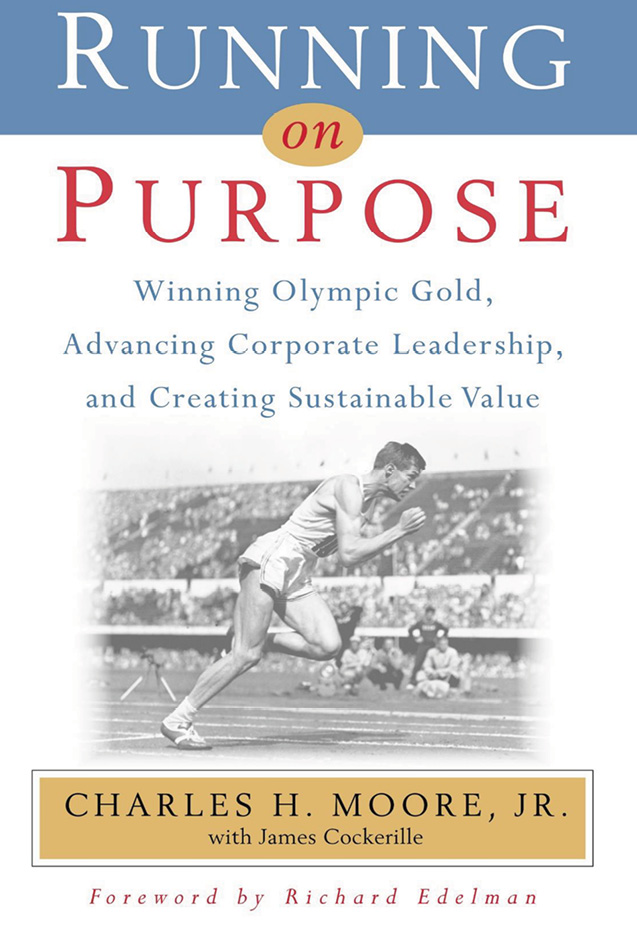- Home
- Media Kit
- Current Issue
- Past Issues
- Ad Specs-Submission
- Ad Print Settings
- Reprints (PDF)
- Photo Specifications (PDF)
- Contact Us

![]()
ONLINE

Running on Purpose
Editors’ Note
Charlie Moore retired in February of 2013 as Executive Director of the Committee Encouraging Corporate Philanthropy (CECP) following a highly successful 13-year run. He is a 1952 Olympic gold medalist in the 400-meter hurdles, has been CEO of three multinational manufacturing companies, Athletic Director for his alma mater, Cornell University, and a member of the President’s Council on Physical Fitness and Sports.

What interested you in writing the book Running on Purpose?
Purpose has been profoundly important in my life, because it has given me a level of alignment with myself and others that was deeper than surface appearance and more authentic. Embracing a purpose is ultimately a human commitment. This book has been written for individuals willing to sprint to the finish. It’s for those who search for real success in sometimes unorthodox ways. I had in mind principled persons who want to lead with vision, move among influential titans, and believe that traditional pathways must often be ignored in order to discover his or her true potential.
What are the key lessons that you wanted to express in the book?
Ultimately, I want this book to be a blueprint for societal change at a pragmatic level that intertwines family, business, and the innovative spark that drives us all. Taken together, these stories illustrate what I call the more socially conscious core of business, and I hope to offer solutions for sustainable practices that are so provocative and inspiring that readers will draw on them for generations.

Is the book more focused on business or philanthropy, or are these two interrelated?
My mantra, starting with CECP, has been that corporate success and community success cannot be thought of as separate. They need to be recognized as interrelated. While it’s true that a company might thrive independently of the health of the surrounding community, it will eventually need the people and services that surround it to be successful if it hopes to grow. Thanks to CECP and inspired CEO leadership, corporations now believe that their social investments are a core business strategy. They find that they are most effective when they bring the best of their business to their corporate philanthropy goals as they seek a higher purpose and prioritize societal need while driving business performance.
Who is this book targeted to, and how broad of a market are you trying to reach?
The audience I would most like to reach is the next generation of business leaders. Their lives will demand passion and resilience, as well as successful business practices. The lessons to be gleaned from this book are central to today’s business leaders, their boards of directors and professionals of all stripes. The keys are contained in the phrase, “the license to lead.” The included in-praise-of remarks from a very diverse audience highlight the limitless breadth of potential reach.
You have spent your life focused on leadership issues. What do you feel are the key traits to being an effective leader?
Recognizing that those traits can, and should vary over time, I feel that I brought to much of my career focus, purpose, intensity, and energy. I had to hone such traits as persistence, consistency, communication, resilience and, above all, a strong belief in values and principles. These all culminate in being recognized as an effective leader.
You have achieved much success in your life. Did writing the book afford you the time to reflect and appreciate what you have accomplished?
The revisiting of my life’s journey has been both educational and refreshing, as well as humbling. More than anything, it has served to remind me how grateful I am to so many, especially my family. The last chapter is entitled, “My Call to Action: The License to Lead.” In that, I was able to codify what I envision to be the “must-haves” for CEOs and their boards, in terms of processes and behaviors for business and society to thrive together. I conclude, “Every business needs a purpose – and a better way to measure their work against the efforts of others.”•